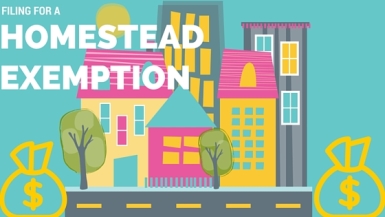Texas Homestead Exemptions
Exemptions for Adults 65+ or Disabled
Age 65 or older and disabled exemptions: Individuals age 65 or older or disabled residence homestead owners qualify for a $10,000 homestead exemption for school district taxes, in addition to the $25,000 exemption for all homeowners.
Persons 65+ and the Disabled Homestead Exemptions
- School taxes:
- Optional age 65 or older/disabled exemptions:
How do I get an additional $10,000 age 65 or older or disabled homestead exemption?
You may apply to the appraisal district up to one year after the date you become age 65 or qualify for disability or up to one year after the taxes are due. If your application is approved, you will receive the exemption for the entire year in which you become age 65 or become disabled and for subsequent years as long as you own a qualified homestead. Beginning in 2005, if your date of birth was on your original homestead application or other written correspondence to the appraisal district about your homestead you will automatically receive the age 65 or older exemption without applying, if you are entitled to the general homestead exemption.
How do I qualify for a disabled person's exemption?
You are eligible if you qualify to receive disability benefits under the Federal Old-Age, Survivors and Disability Insurance Program administered by the Social Security Administration. Disability benefits from any other program do not automatically qualify you. To prove your eligibility, you may need to provide the appraisal district with information on your disability. Contact your local appraisal district for information on what documents are required to prove eligibility.
What is the deadline for filing for a homestead exemption?
You may file for any homestead exemption up to one year after the delinquency date. The delinquency date is normally Feb. 1. If you are age 65 or older or disabled, you qualify for the exemption on the date you become age 65 or become disabled. To receive the exemption for that year, age 65 or older or disabled homeowners must apply for the exemption no later than one year from the date you qualify or one year after the delinquency date. If you miss the deadline you may apply for the following year.
What is a homestead tax ceiling?
It is a limit on the amount of taxes you must pay on your residence. If you qualify your home for an age 65 or older or disabled person homestead exemption for school taxes, the school taxes on that home cannot increase as long as you own and live in that home. The tax ceiling is the amount you pay in the year that you qualified for the age 65 or older or disabled person exemption. The school taxes on your home may go below the ceiling but not above the amount of the ceiling.
However, if you improve the home (other than normal repairs or maintenance), the tax ceiling may go higher because of the new additions. For example, if you add on a garage or game room to the house after you have established a tax ceiling, the ceiling will be adjusted to a higher level to reflect the value of that addition.
Does the school tax ceiling transfer when a person who is age 65 or older or is disabled or is the surviving spouse (age 55 or older) of a person who was age 65 or older moves to another home?
A percentage of the school tax ceiling may be transferred.
The ceiling on the new home would be calculated to give you the same percentage of tax paid as the ceiling on the original home. For example, if you currently have a tax ceiling of $100, but would pay $400 without the ceiling, the percentage of tax paid is 25 percent. If you move to another home and the taxes on the new homestead would normally be $1,000 in the first year, the new tax ceiling would be $250, or 25 percent of $1,000.
To transfer the school tax ceiling, you may request a certificate from the chief appraiser in the last appraisal district in which you received the tax ceiling. You present the transfer certificate to the chief appraiser in the district where the new home is located, when you apply for homestead exemptions on the new home.
If I am the surviving spouse of a disabled person, am I entitled to the school tax ceiling?
No. Only surviving spouses (age 55 or older) of persons who were age 65 or older when they died may benefit from the tax ceiling.
If I am age 65 or older, disabled or a surviving spouse who is age 55 or older, does a tax ceiling apply to county, city or junior college district property taxes?
Yes, if the county commissioners court, city council or board of the junior college district authorizes a tax limitation on the homesteads of persons age 65 or older or disabled. The taxing unit governing body or voters (by petition and election) may adopt the limitation. This local option does not apply to other special districts such as water, hospital, etc.
Can the local option ceiling transfer if the owner who is age 65 or older or disabled moves to another home?
Yes, but the home must be located within the applicable taxing unit - city, county or junior college district. The ceiling on the new home is calculated the same as the school district.
Source: Texas Comptroller of Public Accounts
Related Articles:
Home |
About |
Articles |
Resources |
Site Map |
Privacy Policy
Elder Options of Texas
Copyright 2001-2024
All Rights Reserved
DISCLAIMER: Links to other websites or references to products, services or publications do not imply the endorsement or approval of such websites, products, services or publications by Elder Options of Texas. The determination of the need for senior care services and the choice of a facility is an extremely important decision. Please make your own independent investigation.


